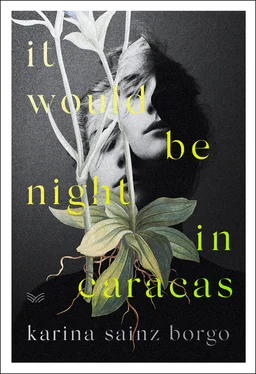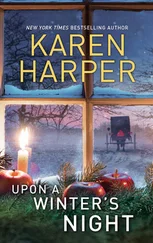“Okay.” Ana gave me a kiss on the cheek and left. Who wants to attend a funeral when you can sense your own brother’s fast approaching?
Next to arrive were María Jesús and Florencia, retired teachers my mother had kept in touch with over the years. They expressed their condolences and left quickly, conscious that nothing they could say or do would make up for the death of a woman too young to be taken from us. They left at a clip, as if trying to get a head start on the reaper, before he came for them too. Not a single wreath of flowers arrived at the funeral parlor except my own, an arrangement of white carnations that barely covered the upper half of the casket.
My mother’s two sisters, my twin aunts Amelia and Clara, weren’t present either. One was rotund, and the other was painfully thin. One ate without stopping, while all the other had for breakfast was a small portion of black beans, while she sucked on a roll-your-own cigarette. They lived in Ocumare de la Costa, a town in the state of Aragua, near Bahía de Cata and Choroní. A place where azure waters lapped at white sand, cut off from Caracas by crumbling roads that were becoming impassable.
At eighty years of age, my aunts had made at most a single trip to Caracas. They didn’t leave their sleepy backwater even to attend my mother’s graduation, and she’d been the first university graduate in the Falcón family. She looked stunning in the photos, standing in the Aula Magna of the Central University of Venezuela: heavy makeup around her eyes, her teased hair squashed flat beneath the mortarboard, the certificate in her rigid hands, and a smile that looked lonely, like she was quietly furious. My mother kept that photograph alongside her Bachelor of Education academic transcript and the notice that my aunts had placed in El Aragüeño , the regional newspaper, so that everyone would know that the Falcóns now had a professional in the family.
We didn’t see my aunts often, only once or twice a year. We traveled to the small town where they lived in July and August, sometimes during Carnaval or Semana Santa. We would give them a hand with the guesthouse and help lighten their financial load. My mother always left them a little money, pestering them while she was at it: one to stop eating, the other to eat. They lavished us with breakfasts that turned my stomach: shredded beef, crispy pork rind, tomato, avocado, and guarapo , a beverage made of cinnamon and unrefined sugar strained through a cloth. They often followed me around the house brandishing the brew, which more than a few times made me faint; I would regain consciousness to the sounds of their fussing.
“Adelaida, if our mother saw this girl of yours, puny as she is and with no meat on her bones, she’d dish her up three arepas smothered in lard,” my aunt Amelia, the rotund one, would say. “What do you do to the poor creature? She’s no bigger than a fried herring. Wait here, m’hija. I’ll be right back … Don’t you move a muscle, muchachita!”
“Leave the girl in peace, Amelia. Just because you’re hungry all the time doesn’t mean everyone else is,” my aunt Clara would sing out from the patio, keeping an eye on her mango trees and smoking a cigarette.
“Aunt Clara, what are you doing out there? Come inside, we’re about to eat.”
“Hold on, I want to make sure those scoundrels from next door don’t come knock down any of my mangoes with a rod. The other day they took three bags’ worth.”
“Here you go, eat only one if you want but there are three more,” said my aunt Amelia, back from the kitchen, with a plate of fried bollos stuffed with pork picadillo. “Come on, eat up, m’hija, it’s getting cold!”
After doing the washing up, the three women would sit on the patio to play bingo amid the clouds of mosquitoes that descended at six in the evening, the same time every day. We always scared them off with the smoke that rose from the dry brushwood once it caught alight. We would make a bonfire and would draw together to watch it burn beneath the day’s dying sun. Then one of the twins, sometimes Clara and sometimes Amelia, would turn in her rattan chair and, growling, would say the magic words: the Dead One.
That was how they referred to my father, an engineering student whose plans to marry my mother were wiped from his mind when she told him she was expecting. Judging by the anger my aunts radiated, anyone would say they’d been left in the lurch too. They mentioned him much more than my mother did; I never heard her speak his name. No word came from him after he left, or so my mother told me. It seemed a good enough incentive not to be fazed by his absence. If he didn’t want to hear from us, then why should we expect anything from him?
I never understood our family to be a large one. Family meant the two of us, my mother and me. Our family tree started and ended with us. Together we formed a junco, a plant capable of growing anywhere. We were small and veiny, almost ribbed, perhaps so it wouldn’t hurt if a piece of us was wrenched off, or even if we were pulled out by the roots. We were made to endure. Our world was sustained by the two of us keeping it in balance. Everything outside our family of two was the exception: supplementary, and for that reason expendable. We weren’t waiting on anyone; we had each other and that was enough.
UTTER DESTRUCTION. That was the feeling I had as I dialed the Falcón guesthouse the day of my mother’s wake. My aunts took their time answering the phone. Two ailing women in that big old house, they had trouble making it from the patio to the lounge room, where a small coin-operated telephone was still connected even though nobody used it anymore. They’d run the guesthouse for thirty years. That whole time they’d changed not even a painting. They were like that, as improbable as the rosy trumpet trees painted on dusty canvases that decorated the grease- and dirt-covered walls.
After several failed attempts, they finally picked up. They took the news of my mother’s death in a bleak mood, saying little. First, I spoke to Clara, the skinny one, then to Amelia, the rotund one. They ordered me to postpone the burial for at least the time it would take them to catch the next bus to Caracas. Between them and the capital was a three-hour journey on a road riddled with potholes and thugs. Those conditions, on top of their old age and ill health—one had diabetes, the other arthritis—would have broken them down. Those seemed reasons enough to dissuade them from coming. I said good-bye, promising to come see them soon—I was lying—so we could say a novena in the town chapel. They conceded reluctantly. I hung up the phone sure of one thing: the world as I knew it had begun to unravel.
Toward midday, two neighbors from our building appeared, expressing their condolences and letting loose a barrage of consolations, as useless as tossing bread to pigeons. María, a nurse who lived on the sixth floor, went on about eternal life. Gloria from the penthouse seemed more interested in knowing what would become of me now that I was “all alone.” Of course, the apartment was too large for a childless woman. Of course, the way things were, I’d have to consider renting out at least one of the rooms. Today you get paid in US dollars, Gloria said, if you’re lucky enough to find someone you know. Respectable people, good pay. There are so many crooks around. And since solitude does nobody any good, and now you’re all on your own, it would be wise to have others around, wouldn’t it, at least in case of an emergency. You must know someone to rent out a room to, do you? I expect you do, but if not, I have a distant cousin who right this minute is looking for a place to rent in the city. What a fabulous opportunity, don’t you think? She could move in with you, and you could earn a little extra. A great idea, no?
Читать дальше












